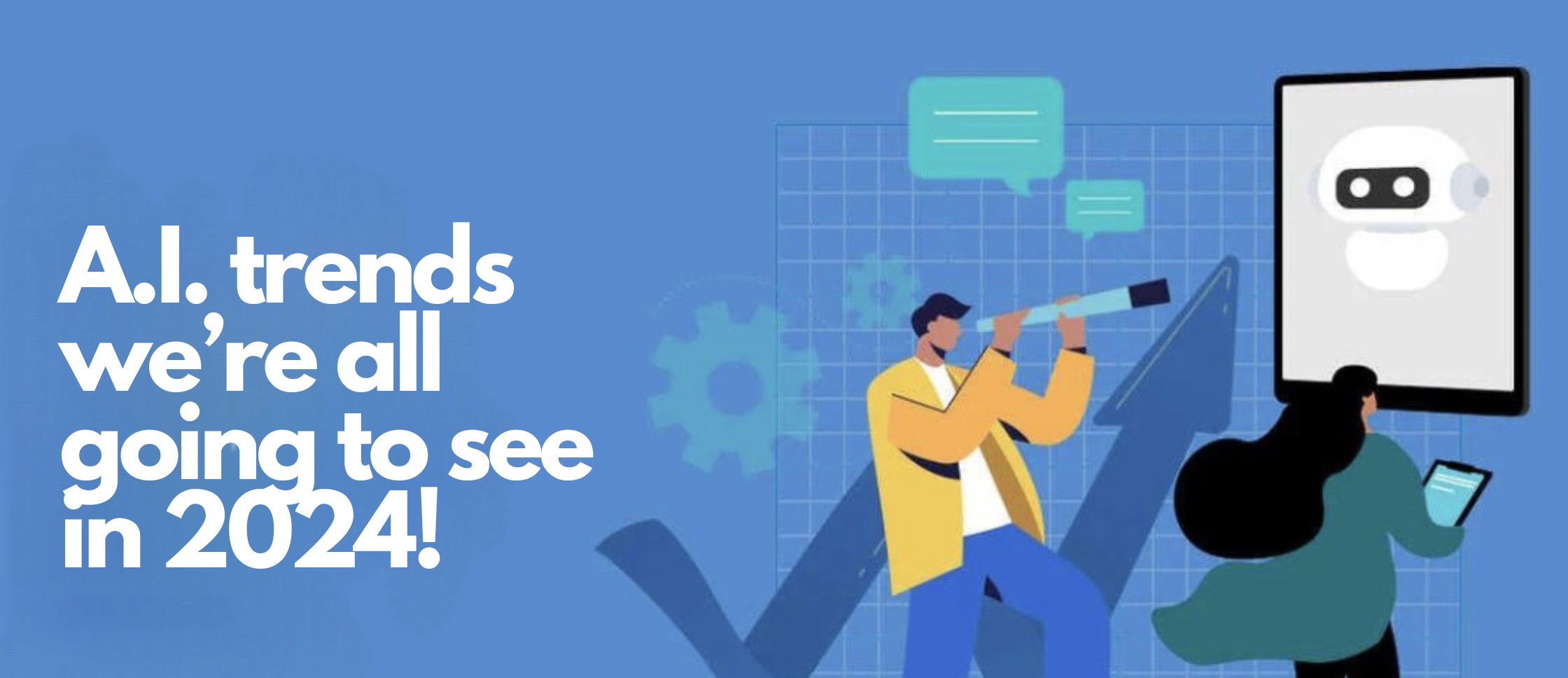
The Rise of AI
If you haven’t heard of Generative AI (artificial-intelligence) or machine learning, you’ve probably been off-planet for awhile. In just a few months time AI-powered tools have created a seismic shift in how we use technology, but AI is not new. For example, most people today whether they realize it or not are daily users of AI-powered personal assistants, such as Siri (now 12 years-old), Google Assistant and Amazon Alexa. AI has been integrated into smartphones, smart speakers, watches and other devices, even our cars, and can perform a wide range of tasks.
Additionally, daily most use search engines to social media channels, which all use AI algorithms to deliver personalized results and curate our feeds based on our interests and behavior. How about shopping? Yep there too. Amazon, Overstock, eBay and many others use AI algorithms to learn our shopping preferences and show us related items based on what we’ve been browsing for. The same is true of streaming media platforms for shows and music to recommend movies or songs based on our listening history. And I could go on and on, but I won’t. I’ve made the point that AI is not really new, its just taken huge step forward and is transforming technology at light speed right before our eyes.
How AI is Changing the Travel Industry
Did you know that “94% (of C-level executives) reported that artificial intelligence would ‘substantially transform’ their companies within five years, most believing the transformation would occur by 2020”? Their predictions were correct and 2023 was it’s breakout year. Currently, the majority of travel destinations are rallying as fast as they can to leverage AI-powered websites, booking tools, and other machine learning resources to more fully engage customers, urge more impulsive bookings, incite extended stays, and increase affinity and satisfaction levels.
AI offers so many new possibilities for enriching online travel experiences. For instance, one example I love is from Hyatt. In some New York hotels they have upgraded its services by offering AI-powered beds with sensors that track a a guests heart rate and breathing, adjusting the bed’s temperature and firmness to facilitate deeper, more restorative sleep. The bed even cools down around the time you set it for to get up to gently wake you from slumber. Check out this impressive technology! 👇
True, AI’s influence on online travel is still in its early stages, but it is clearly evident that AI will make a significant impact on the way we travel, the affinity we adopt of destinations, and simply put, directly affect our selection choices of one vacation spot over another.
4 Ways AI is Increasing Bookings, Extending Stays, and Generating More ROI for Travel Destinations
I’ve spent some time researching 4 specific examples I see AI increasing bookings, extending stays, and generating more ROI for online travel destinations in 2024 and beyond, here they are:
- AI-powered personalized itinerary planning: Generative AI-powered platforms can analyze travelers’ personal preferences, interests, and budget restrictions, etc., to create personalized travel itineraries. By using data from previous trips, behaviors, likes and dislikes, and destination information, AI algorithms can suggest tailored plans that suggests activities, attractions, and restaurants that are tailored to their interests. This can help to save travelers time and effort, and it can also help to ensure that they have a memorable and enjoyable trip. AI-powered itinerary planners could be used to create a custom itinerary for a traveler who is interested in hiking, water sports, dancing, biking, sightseeing, etc.
Benefit: Travelers can explore new destinations with confidence, knowing their itineraries are curated according to their unique tastes and preferences. Any potential disappointment is practically eliminated.
- AI-powered travel assistants: AI-driven virtual travel assistants, like those used by Expedia, act as personalized concierges, offering real-time travel tips, recommendations, and assistance throughout the their journey. These AI companions can provide historical insights on local attractions, specific dining options, available transportation, and even help with booking changes or emergency situations.
Benefit: Travelers gain access to reliable, on-demand support, ensuring a smooth, safe and stress-free travel experience.
- AI-powered destination previews: Generative AI can transform static images and videos into immersive virtual experiences, allowing travelers to virtually self-explore destinations before making their reservations. By generating lifelike 360-degree tours, potential visitors can gain a more comprehensive understanding of a location, the geography, sites, activities, promotions, offers, etc., enabling them to make better-informed travel decisions.
Benefit: Destination previews enhance the decision-making process, encouraging more confident bookings, extending their stay based on an enhanced experience of all there is to do at a destination, and reducing the chances of disappointment upon arrival.
- AI-powered real-time language translation: Language barriers can often hinder travel experiences, making communication with locals difficult. Generative AI language translation tools can bridge this gap by providing real-time translation services. These tools can be integrated into mobile applications or wearables, enabling seamless interactions with locals and access to valuable cultural insights.
Benefit: Removal of all barriers, your destination is open and available for global travelers 24/7/365, fostering deeper connections with your communities and experiencing authentic cultural exchanges automatically.
Other AI Features That Will Revolutionize Travel in 2024 and Beyond
In addition to these key uses of AI in travel and tourism, here are some other AI features that are already in use now that I predict will advance to prominence later this year and be mainstream in 2024. Here are some details about these features:
- AI-powered crowdsourced reviews: AI can be used to analyze and aggregate crowdsourced reviews, helping travelers to make more informed decisions about where to stay, what to do, and where to eat. This can help to increase engagement by giving travelers a better understanding of what other travelers have experienced at a particular destination. For example, an AI-powered crowdsourced review system could be used to identify the most popular restaurants in a city, or to find the best hotels for families.
- AI-powered translation of travel documents: AI can be used to translate travel documents, such as passports, visas, and boarding passes, into multiple languages. This can help travelers to avoid any unexpected problems when they are traveling abroad. For example, an AI-powered translation system could be used to translate a passport into 1,000 different languages.
- AI-powered customer feedback: AI can be used to collect and analyze customer feedback, helping travel companies to improve their products and services. This can help to improve the customer experience and lead to more bookings. For example, an AI-powered customer feedback system could be used to track customer satisfaction levels, or to identify areas where travel companies can improve their offerings.
- AI-powered predictive analytics: AI can be used to predict future trends in travel, such as the most popular destinations, the best times to travel, and the most in-demand activities. This can help travel companies to make better marketing decisions and to ensure that they are offering the right products and services to their customers. For example, an AI-powered predictive analytics system could be used to predict which destinations are likely to be popular in the next year, or to identify which activities are likely to be in high demand during the upcoming holiday season.
- AI-powered conversational chatbots with emotional intelligence: AI chatbots with emotional intelligence can be used to provide travelers with a more personalized and engaging customer experience. These chatbots can understand and respond to travelers’ emotions, and they can also learn from their interactions with travelers to improve their responses over time. For example, an AI-powered chatbot with emotional intelligence could be used to help a traveler who is feeling stressed about their upcoming trip, or to provide a traveler with recommendations for activities that are tailored to their mood.
- AI-powered personalized pricing: AI can be used to personalize pricing for travel products and services based on factors such as the traveler’s past booking history, their current location, and the time of year. This can help to increase engagement and ROI by ensuring that travelers are offered the best possible price for their travel needs. For example, an AI-powered pricing system could be used to offer a traveler a discount on their hotel stay if they book their flight and hotel together.
- AI-powered content marketing: AI can be used to create personalized content that is tailored to the interests of individual travelers. This can help to increase engagement by providing travelers with the information that they are most likely to be interested in. For example, an AI-powered travel blog could recommend articles based on a traveler’s past reading behavior.
- AI-powered social media marketing: AI can be used to automate social media marketing tasks, such as posting content, responding to comments, and running contests. This can help to save time and resources, and it can also help to improve the effectiveness of social media marketing campaigns. For example, an AI-powered social media manager could be used to post daily travel photos and videos, or to run contests for free hotel stays.
- AI-powered pricing: AI can be used to optimize pricing for travel products and services. This can help to maximize profits by ensuring that products are priced at the right level to meet demand. For example, an AI-powered pricing system could be used to adjust prices based on factors such as supply and demand, competitive pricing, and seasonality.
You are probably saying ‘wow, I see how important AI is as a marketer! How can I learn more about specific tools and training on how to use them?’ Great question, I’m glad you asked.
The Answer for AI in Travel Marketing
First, time is of the essence, my fellow marketers! The unavoidable truth is that if we don’t adapt to the AI revolution, our business will suffer under the weight of its consequences. The year 2024 is just around the corner, and it’s crucial that we act now to avoid being left in the dust by forward acting destinations.
So, we have put together an extraordinary e-Book exclusively for travel marketers like you, completely up-to-date with our recommendations. It’s entitled – “50 Generative AI Tools for Travel Marketers.” This resource will be broken down into categories for easy reference, will include direct links to the tools, indicated whether they are free or not. It will be a great resource for you and propel you ahead of the competition as 2024 approaches!
We will include it in our August 2023 newsletter for free. Look for that in your email shortly is you are a subscriber. It will also be available on our website as a free download for the month of August.
Start envisioning how you can utilize AI to elevate your travel marketing game to unprecedented heights. The world of AI is waiting for no one, and it’s time to seize it with unwavering determination.
Tim Moore
Partner




